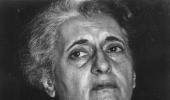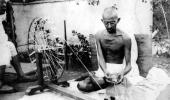'In being dismissive of Naveen, his colleagues showed incredible naivety.'
'On the few occasions that he put his foot down, the overconfident party leaders, who believed they were using him and not the other way around, failed to read the signs of what was to come.'
An exclusive excerpt from Ruben Banerjee's biography, Naveen Patnaik.

Even before Biju Patnaik's funeral pyre was lit, some of his grieving partymen had begun to plot on how best to cash in on his memory.
Several of his top followers suggested that the urn containing his ashes be taken around the state so that Odias could pay their homage to him.
That the real motive was political was not lost on Biju Patnaik's intensely private children. They refused and Prem Patnaik took the urn with him to Delhi.
Having lost his chief ministership in 1995, Biju Patnaik had contested Lok Sabha elections the following year from two seats -- Aska in Ganjam district and Cuttack.
He won both, but retained Aska and gave up the Cuttack seat.
On his death, a by-election was to be held in Aska and his partymen looked for a suitable candidate to fill his shoes.
Elections in 1996 had been particularly vicious for Biju Babu's Janata Dal.
The party won just four seats in Odisha, including the two won by Biju Babu himself, and party leaders were less than optimistic about their poll prospects in the months leading up to the Aska by-poll.
Their first choice for a candidate was V Sugnana Kumari Deo, a political veteran and a scion of the erstwhile Khallikote royal family. But still smarting from her loss against Prime Minister P V Narasimha Rao from Berhampur the previous year, she refused.
Feelers were then sent to another senior leader, Ram Krushna Patnaik. He, too, turned down the offer, fearing an inevitable electoral defeat.
As the deadline for the nomination drew close, followers of Biju Patnaik held frantic parleys at Srikanta Jena's official residence in Delhi on Pandara Road.
"The more talks were held, the more we realised the urgency for resurrecting the dead Biju," admitted a top leader who participated in those discussions.
The turnout at Biju Babu's funeral was a sign of a huge sympathy wave for the late leader. It only remained to be tapped to the party's electoral advantage.
Having started out as an underling of Biju Patnaik, Jena had made it big in New Delhi.
He was a powerful minister in the United Front government and harboured greater political ambitions. The grapevine has it that he undermined Biju Patnaik in his final years, hoping to wrest for himself the reins of the state unit of the party.
But not many within the party in Odisha were enamoured of Jena or his crowd-pulling abilities. Instead, they were looking to find someone who could rightfully lay a claim to Biju Babu's legacy.
Even Jena had a fair inkling of his public standing in Odisha.
Piqued by stories that he had plotted to keep the state Janata Dal patriarch out of the central Cabinet in his final days, some angry mourners threw slippers and the choicest abuses at Jena during Biju Babu's funeral.
Faced with an existential crisis, even Jena agreed that a Patnaik scion was best suited to lead the party in the state.
The stage was thus set for a Patnaik family succession.
Senior leaders from Odisha camped at Jena's Pandara Road house and feelers were sent to Biju Patnaik's children.
Weeks passed before the first responses came from the family and they were not encouraging.
Prem said he wasn't interested. Some insiders feel he refused as it would make him politically vulnerable given his business background.
Many viewed Gita as the natural choice as she was temperamentally the closest to Biju Babu. But married to publisher Sonny Mehta, she had settled in the United States decades ago. She too said no.
Now the only option left was Naveen, the quietest and the most reticent of the three children.
With each passing day the party leaders lost hope until finally they heard back from the family: Naveen had agreed to join politics and contest the by-election for his father's seat.
An industrialist who knew the family well insists that Naveen wasn't pressured by his siblings to join politics.
"It was the other way around," he claims.
One night, Naveen walked up to Prem and made his intentions clear.
'Now that you and Rani (Gita's pet name) have refused, can I go to contest from Aska?' Naveen is supposed to have asked his startled brother.
Even regular visitors to Biju Babu's Delhi home seemed to know little about Naveen. He was rarely seen around the house and he never mingled with his father's political friends.
Naveen was busy party-hopping and indulging in the finer things of life.
He had by then authored three coffee-table books: A Second Paradise (1985), on Indian courtly life from 1590 to 1947; Desert Kingdom (1990), on the Rajputs of Bikaner; and The Garden of Life (1993), a compendium on medicinal plants and species.
These were published by Doubleday in the US and two of them were edited by his good friend Jacqueline Kennedy Onassis.
On Jackie's 1983 visit to India, Naveen had accompanied her to Jaipur, Jodhpur, Lucknow and Hyderabad.
The immediate past of the soft-spoken Naveen appeared incompatible with politics.
Naveen instilled little confidence in the Odisha leaders and few expected him to survive the rough-and-tumble of political life.
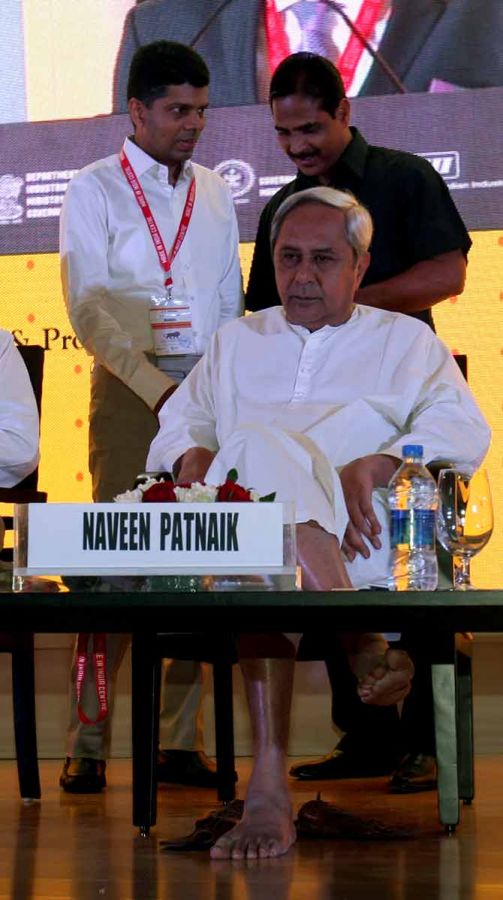
As Naveen boarded a plane and headed to Odisha to file his nomination papers for his first election from Aska, most thought he would at best be a passing phenomenon.
But desperate for a member of Biju Babu's family to take over his legacy, they had no other choice.
With senior party leaders such as Ram Krushna Patnaik and V Sugnana Kumari Deo by his side, Naveen filed his nomination papers before the returning officer in the district headquarters of Chhatrapur, a half-hour car drive from the seaside resort of Gopalpur.
Somewhat overwhelmed by the turn of events, Naveen excused himself several times for quick smokes in the anteroom as officials scrutinised his papers.
The rest was easier than anyone had imagined.
Since he neither spoke nor understood any Odia, Naveen rarely gave speeches and, instead, went around the constituency waving to the people.
Dilip Ray, the hotelier-cum-party veteran at whose house Biju Patnaik spent his final days, managed his election.
Debasis Nayak, a young party activist, chaperoned Naveen during his first campaign.
Naveen won hands down.
But a bigger war erupted behind the scenes with different factions of the party in Odisha laying claim over him.
Jena was the most influential of the state Janata Dal leaders, by virtue of being a Union minister. Biju Patnaik's declining health and fading fortunes had given Jena the opportunity to network and become a minister at the Centre.
He wanted Naveen to work for the Janata Dal and shore up the party's sagging fortunes in Odisha.
But other state party leaders had their own ideas.
Bijoy Mohapatra, for one, reportedly held a grudge against Jena.
Jena had become a Union minister in 1996 by getting Mohapatra and MLAs loyal to him to lobby for him.
Allegedly the deal was that once Jena became a minister, he would help Mohapatra become the Odisha president of the Janata Dal by overthrowing the incumbent Ashok Das.
But Jena reneged on his promise.
So now Mohapatra took the initiative to float the idea of a new party, robbing Jena of the party itself.
Several other leaders were also feeling stifled in the Janata Dal which Jena controlled along with Ashok Das. They all felt the time was ripe to break away and float a regional party under Naveen.
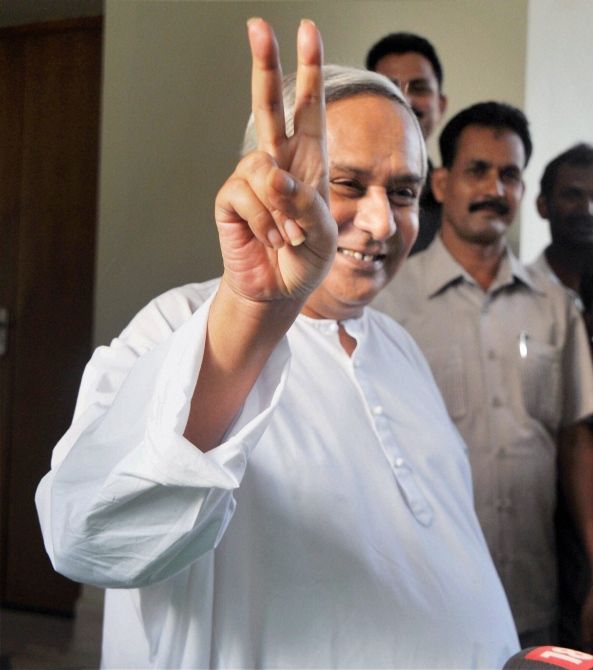
Historically, Odisha had always had an appetite for a regional outfit.
Having fought long and hard for a separate state uniting Odia-speaking tracts -- Odisha, when it came into being in 1936, was the first Indian province to be created on linguistic lines -- Odias suspected their collective interests were often given short shrift at the national level.
Having been elected a member of Parliament, Naveen arrived in Aska, wide-eyed.
Though just an hour's drive from the commercial town of Berhampur, known for its unkempt and crowded roads, Aska was primarily rural, where most people were poor and open defecation was rampant.
Naveen, too, was aghast and possibly held his nose at times as he negotiated Aska's serpentine roads, lined with filth and human excreta.
Though his colleagues in the party saw little political mettle in him and viewed him more as a mascot and a means to harness votes from Biju Babu's sympathisers, Naveen took to his new role in earnest.
He soaked in the sights and sounds that revealed themselves during his visits to his constituency.
When he first visited Aska to file his nomination papers, his sister Gita had come along to boost his morale.
In most of his subsequent visits, Ram Krushna Patnaik and V Sugnana Kumari Deo, two local political stalwarts, gave him company and showed him around.
Naveen constantly swung between delight and dismay at what he saw.
On a trip to a government hospital, he was astounded to see stray dogs sauntering in and out of the wards.
'Dogs in the hospital? Unbelievable,' he repeatedly told local senior officials in the following days as images of the ill-maintained and ill-equipped hospital continued to haunt him.
What he could change was the condition of the dying TamparaLake in Chhatrapur.
The once pristine lake, 5.8 kilometres long and 670 metres wide, was being choked with the filth and garbage that the drains and nullahs fl owing into it brought in.
Naveen got the lake cleaned and revived, arranging money from the local area development fund at his disposal as an MP in what was possibly his second intervention as an elected representative.
Naveen was enraptured by the beauty of the Bhairavi temple at Mantridi and the Surya mandir, perched on the top of a hill near Berhampur.
The hill was almost barren and he initiated a special plantation drive to turn its slopes green. Other leaders of the party in Odisha were happy to see Naveen doing things that came naturally to him.
A founder member of the Indian National Trust for Art and Cultural Heritage, he seemed more interested in 'softer' issues and valued tradition, trees and history.
The new MP, they overwhelmingly felt, was a political novice and posed no long-term threat to them.
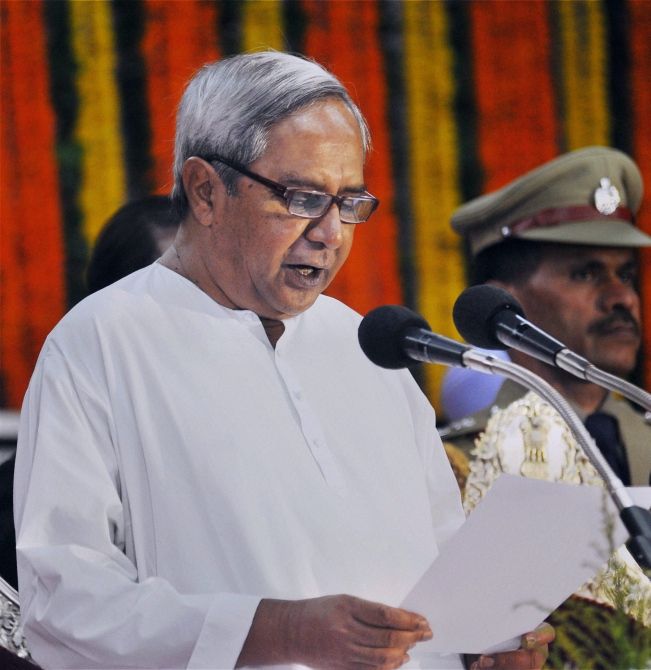
No alarm bells rang for the state leaders who nursed bigger ambitions for themselves when Naveen became a central minister after the United Front government fell and a Bharatiya Janata Party government led by Atal Bihari Vajpayee took over.
The Biju Janata Dal had performed creditably in the 1998 general elections as an ally of the BJP.
Ministerial berths were due to the party in the central Cabinet and Naveen, as the party chief, was seen as the natural claimant.
Many thought he would be given a portfolio of little consequence.
Vajpayee, in his first meeting with Naveen in Parliament, reportedly told him that he was a natural fit as the Union culture minister.
Naveen, however, got a more important portfolio and became the union minister for steel and mines.
His BJD colleagues in Odisha made light of it, believing it was done to honour the memory of Biju Patnaik, who had held the portfolio during the Janata Party rule between 1977 and 1980.
In being dismissive of Naveen, his colleagues showed incredible naivety.
They misread him badly, taken in completely by his outward gentle behaviour. He was prim and proper and always respectful of others.
When meeting senior leaders, he always stood up and responded with warmth.
He pestered them with questions about Odisha, its people and politics in general and seemed all at sea in his new vocation.
On the few occasions that he put his foot down, the overconfident party leaders, who believed they were using him and not the other way around, failed to read the signs of what was to come.
One such instance was when the newly formed BJD was being registered with the Election Commission.
As the constitution of the party was being drawn up by a group led by senior leader Trilochan Kanungo, Naveen insisted he be made founder president of the party, a position for life.
The framing of the constitution was held up for weeks as Naveen refused to take no for an answer.
He finally acquiesced and gave up only after being told that such a provision for a permanent president could not be allowed under the Election Commission's rules for a democratic party.
But the party’s registration was held up for some more time due to another of Naveen's demands.
The BJD's newly drafted constitution entrusted its political affairs committee with the sole power of choosing candidates for elections.
But Naveen sent word that he, as party president, should have the final say, insisting that he should have the power of cancelling the nomination of a candidate chosen by the PAC.
The demand he made was odd, but not one party leader made much of it.
The rules were amended and Naveen, finally, had his way and the registration could proceed.
To get things done the way he wanted, Naveen never raised his voice or threw a tantrum. He spoke gently, gave the impression that he didn't know too much and lulled his party colleagues into comfort.
"He acted more like a child coming to terms with a new toy that he had just acquired," said a leader, who has observed him closely from his nascent political days.
In hindsight, though, it seems Naveen was playing a longer-term game.
He was crafty and calculating; he knew what he wanted and how to get it. He took small but measured steps.
With Odia names being Greek and Latin to him, there were moments of embarrassment, too.
During a visit to Chandikhol, the town along the national highway halfway between Bhubaneswar and Balasore, he mistakenly referred to it as 'Chadikhol' (meaning 'open your underpants') in the middle of a public address.
 Another time, he was in Balasore, where he attempted to invoke the name of the state's most famous litterateur, Fakir Mohan Senapati.
Another time, he was in Balasore, where he attempted to invoke the name of the state's most famous litterateur, Fakir Mohan Senapati.
The long-dead Senapati hailed from Balasore and is still revered for his seminal works such as Chha Mana Atha Guntha and Rebati.
But Naveen got it wrong, referring to the writer as Fakir Mohan Satpathy. It was equivalent to a Bengali politician getting Tagore's name wrong.
But these harmless, and hilarious, gaffes showed Naveen as unsure, simple and still uncooked, perhaps only a ploy to further lull his potential rivals into a false sense of security.
Excerpted from Naveen Patnaik by Ruben Banerjee, with the kind permission of the publishers, Juggernaut.
